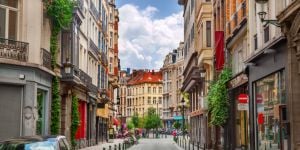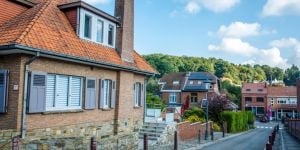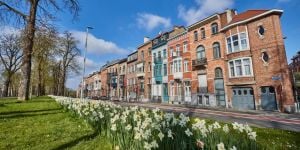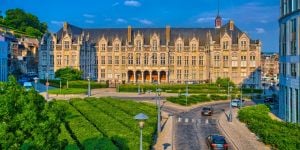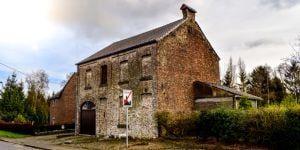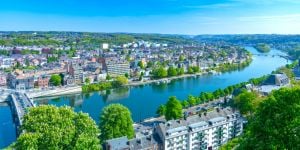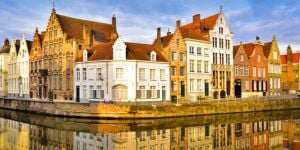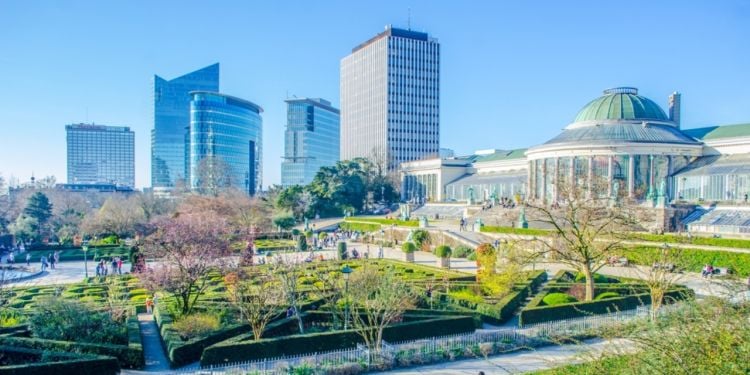
As it's a multicultural city with a healthy job market, it's no surprise that Brussels is so popular with expats. As an inexpensive place to live compared to the nearby capitals of Paris, London, and Amsterdam, Brussels offers its residents a very high standard of living.
When moving to a new city, one of the priorities is finding a place to live. To help you out, here's everything you need to know about finding accommodation in Brussels.
Due to the European institutions and organizations such as NATO being based in Brussels, the capital welcomes many expats who come here to work in an international environment every year. In comparison, many expats stay and work in Brussels for decades after arriving, just as many people head home when their employment ends. As such, accommodation is never too hard to find, as apartments and houses continually become available across the city.
Communes in Brussels
After deciding to move to Brussels, one of the main priorities is finding accommodation in the capital, home to almost 2.1 million inhabitants. All in all, the city is made up of nineteen different communes (or municipalities), and each has its unique feel, with all of them having something different to offer.
Bruxelles-Ville
One of the most famous communes to live in is Bruxelles-Ville, the city's historic center. You'll find many prominent tourist attractions, bars, and restaurants here.
As Bruxelles-Ville is located in the heart of the capital, it has excellent transport links. So in no time at all, you can get to most places in Brussels. This popularity, however, does mean that it can be a bit harder to find accommodation, and administrative services often have long wait times.
Ixelles
Ixelles is another famous commune with expats. It's trendy and has plenty of restaurants, shops, and entertainment, such as movie theaters.
This commune is diverse and perfect for families wanting to live in a melting pot. For example, neighborhoods like the African Quarter Matonge and Place de Chatelaine are within the commune. You'll find people from all walks of life here in Ixelles!
Ixelles also has excellent transport links to the rest of the city.
Etterbeek
Etterbeek is another trendy commune, especially if you have young children. Many expat families believe this is the best commune to live in Brussels since it has the highest number of schools and universities in Brussels! Not only that, but Etterbeek boasts beautiful 20th-century townhouses, which are perfect for small families.
This is not to say that Etterbeek isn't suitable for young professionals. There are plenty of small apartments ideal for a single person. Plus, there's plenty to do at night in this commune so you won't be bored. And if you ever want to venture out to the rest of Brussels for lively nightlife, there are plenty of transport links in Etterbeek.
Saint-Gilles
Want to get a taste of the local life in a trendy commune? Then consider Saint-Gilles. You'll have access to fantastic restaurants, cafes, shops, movie theaters, art galleries, and even Turkish baths. Not to mention, this commune has excellent nightlife as well.
The Gare du Midi station is located in Saint-Gilles, so needless to say, you have excellent transport links in this commune.
Woluwe-Saint-Lambert
Woluwe-Saint-Lambert is located on the outskirts of Brussels, so this is ideal if you want to live somewhere a bit quieter.
Woluwe-Saint-Lambert has practically everything you need there, so it's excellent for those who dislike traveling far. You'll find plenty of public amenities and green spaces here.
Woluwe-Saint-Pierre
This is another commune that's located on the outskirts of Brussels. It's great for larger families since there are bigger houses with gardens for the kids to play in. But if you're looking for apartments and townhouses, this commune's got those, too.
Woluwe-Saint-Pierre is pretty much like Woluwe-Saint-Lambert in that it's a self-contained commune where you'll find all the amenities you'll ever need.
Schaerbeek
This is a commune that's not very far away from Brussels's city center. Schaerbeek is a vast melting pot rich in culture, food, and art. Around 140 people of different nationalities live here!
This commune has lots of hustle and bustle, so if you want an exciting life, consider Schaerbeek. Enjoy green spaces, as well as Art Deco and Art Nouveau architecture.
Uccle
This is another commune to consider if you're searching for a big house with a family to accommodate. Uccle is perfect for expats since there's a huge international community here. There are also plenty of international schools for your children to go to.
Despite the large expat population, Uccle has a small-town feel, perfect for those who want to escape big-city life.
Watermael-Boitsfort
This commune is next to Ixelles and has excellent access to Brussels's city center. But despite this central location, Watermael-Boitsfort has many rural houses and villas, which allows you to enjoy the countryside.
For those with children, you'll be pleased to know that the International School of Brussels is located here.
Saint-Josse-ten-Noode
Saint-Josse-ten-Noode is Brussels's smallest commune. However, don't let that fool you, as it's one of the most densely populated communes! This means it's a rich melting pot of cultures, and because the area's so densely populated, you never have to go far to “travel” the world. In particular, many expats are from Turkey and the Middle East, so you'll feel at home if you're from these areas.
If you're a fan of inspiring architecture, then Saint Josse-ten-Noode is where you need to be. This commune has many gardens and neoclassical glasshouses that are interesting to view and walk through.
Other noteworthy communes in Brussels
Within the city, Forest and Molenbeek-Saint-Jean are all located not too far from the city center, and they're all home to very multicultural populations. As they are less popular amongst expats than the neighborhoods mentioned above, you can find cheaper housing here and lots of hidden gems.
The more residential neighborhoods of Auderghem and Anderlecht lie on the periphery of Brussels. While these all have many green spaces, they're much quieter and more peaceful than those nearer the city center.
The neighborhoods of Berchem-Saint-Agathe, Jette, Ganshoren, and Koekelberg are clustered together to the northwest of Brussels. Relatively unknown to most expats in the city, they offer up some very affordable housing, partly due to their distance from the center of Brussels. In this respect, they're very similar to Evere in the east of the city, where NATO is based.
While most expats working in Brussels decide to live in the city, the country's fantastic transport links and the short distance between cities mean that every day, people commute to work from neighboring cities such as Antwerp, Ghent, and Leuven, all of which are very nice places to live.
Types of accommodation in Brussels
Regarding the types of accommodation in Brussels, you'll find everything from elegant townhouses to rent to student accommodation and shared apartments. For short-term stays, you can also look into the numerous hotels, hostels, apart-hotels, and Airbnbs scattered around the city.
As you can see, each area has its characteristics, positives, and negatives. So, you'll want to consider your priorities when choosing where to stay in Brussels.
Rent prices in Brussels
For a capital city and one that's home to so many powerful and prestigious international organizations, Brussels is a remarkably affordable city in which to live. Rent prices aren't too high. You'll usually pay around €1,000 to €1,500 monthly for a two-bedroom apartment near the center. However, in all likelihood, you'll probably have to pay for gas, electricity, and water.
Rents get lower the further you go from the center, depending on whether you sign up for a fully furnished apartment. Apartment-sharing is very common and is the most affordable form of accommodation if you want to stay in a nice place. Student accommodation is the cheapest and most basic, with some single rooms going for as little as €300 a month. However, with inflation in the cost of living, the general budget for a kot is between €400 and €450.
Rental conditions in Brussels
When renting an apartment in Brussels, there are several essential things to consider, such as the lease. Many people arriving in the city for the first time will be surprised that most rental contracts are offered on a 3-6-9 basis. This means a rental agreement in Brussels can last three to nine years! While this may sound a little crazy to some people, it's a guarantee of stability that gives tenants even more freedom and rights, unlike in other Belgian cities. In Brussels, you can break the contract at the end of your work contract or if you have to move house unexpectedly. Bear in mind, however, that you will have to pay the landlord compensation equivalent to three months' rent if you have to break the contract within the first year.
Because of the Belgian preference for this property rental system, it can be a little tricky to find short-term accommodation in Brussels, although it is certainly possible. In preparation for signing a rental contract in Brussels, the landlord and prospective tenant usually schedule a visit to the property. They then carry out an inventory of fixtures, which both parties agree to sign. This determines the initial state of the property and lists any existing problems so that the two parties are not at odds over anything when the tenant moves out. A security deposit of up to three months' rent is usually required. The amount will then be placed in escrow in a Belgian bank account in the tenant's name.
During the lease period, responsibility for the property's condition rests with the tenant, and while this means you'll have to keep the place clean and in good repair, it also gives you more freedom to furnish to your taste and feel at home. At the end of the lease, however, you'll be expected to return the property in the same condition you found when you moved in. While tenants are responsible for everything they use in the apartment, the landlord is responsible for structural maintenance and sorting out any problems that might arise with the plumbing, electricity, or heating systems, for example.
Before signing the lease contract, the tenant may be asked to provide proof of identity, income, address, tax declaration, bank and/or business references at the landlord's request.
Finding accommodation in Brussels
When it comes to finding accommodation in Brussels, there are many ways to go about it. Many websites offer properties for viewing, and many expats often find their apartment or house on Immovlan.be or Immoweb.be. Although website scams are relatively rare, paying close attention is always a good idea.
Warning:
Never pay a deposit before visiting the apartment and signing the lease.
To help you in your search, use a real estate agent. You'll find a list of them for all Brussels communes on the logic-immo.be website.
For those of you with a little more time on your hands, it might be to your advantage to stroll through one of the neighborhoods whose atmosphere you might have enjoyed. You're sure to find signs with the words "for rent" or "te huur" (in Dutch) posted outside properties or in apartment windows. If you come across a property that appeals to you, call the number displayed and schedule a visit with the owner.
Another excellent way to find accommodation in Brussels is to turn to social networks. For example, many Facebook groups offer shared accommodation opportunities and properties for rent. However, be aware that many scammers target expats in these groups. Keep your wits about you; if something seems too good to be true, be wary! Again, never deposit until you've seen the apartment and have the keys in your hands.
Useful links:
We do our best to provide accurate and up to date information. However, if you have noticed any inaccuracies in this article, please let us know in the comments section below.
